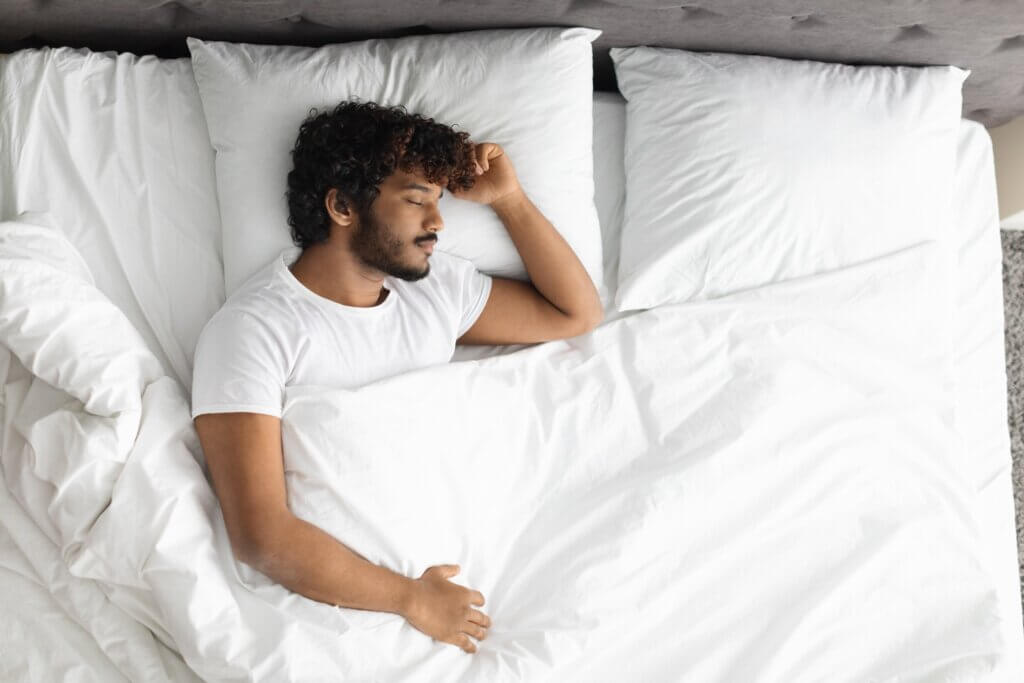Melatonin for Sleep Problems: What You Should Know

Melatonin is a hormone that is secreted by the pineal gland and that, among other things, has the function of regulating sleep cycles. The body of a healthy person produces enough melatonin to guarantee the stabilization of these cycles, although, due to different factors, reasons it may not be enough. Faced with these episodes, many people turn to melatonin for sleep problems.
According to some estimates, up to 30% of adults worldwide have trouble falling asleep. In this sense, the use of sleeping pills has increased worldwide. Millions of people resort to them without the mediation of a specialist, among which melatonin for sleep problems has a leading role. Let’s see what scientists say about it.
Using melatonin for sleep problems
As noted by the Centers for Disease Control and Prevention (CDC), melatonin is sold synthetically as a nutritional supplement in the US. It isn’t regulated as a drug by the FDA, which is also the case in many countries around the world. Access and intake of melatonin as a sleep aid is increasing, and it is almost always used without the guidance of a health professional.
Indeed, and as Johns Hopkins Medicine points out, melatonin for sleep should never be used for more than two weeks. Also, only 1 to 3 milligrams before bedtime is recommended; it is not a long-term alternative for sleep problems. However, despite these claims, many people use it for months and in higher doses.
We have initiated these warnings due to the uncontrolled use of this and other sleep supplements. Although, having said this, melatonin is a timely and effective option to deal with insomnia and other sleep disorders.
There is scientific evidence that supports the intake of melatonin to sleep, both in shift workers, for people with sleep problems, and also for healthy people.
How does melatonin affect sleep quality?

The first thing you need to know is that melatonin is a natural hormone. It’s produced in the pineal gland and is then released into the bloodstream.
Its main function is to regulate the biological clock, although it also helps stimulate the production of growth hormone, contributes to the functioning of the immune system, regulates appetite, modulates the production of gonadotropins, acts as an antioxidant, and fights free radicals.
The secretion increases when night falls and decreases when exposed to sunlight (also with artificial light). It’s for this reason that you’re sleepy at night and active throughout the day.
There are two types: endogenous melatonin (which is produced naturally by the body) and exogenous melatonin (which is produced synthetically). The latter is sold as a capsule, pill, chewable tablet, and as a liquid.
The synthetic hormone has the same properties as the natural hormone, so it helps regulate circadian rhythms and adjust the sleep-wake phase. There isn’t enough information about its safety in women who are pregnant (or trying to become pregnant), who are breastfeeding, and in people with bleeding disorders. Its intake should always be supervised by a professional.
Side effects of melatonin for sleep problems
Taking synthetic melatonin to sleep is safe. However, and especially in the face of medium or long-term use, several side effects have been found. Specialists have found that the most common are the following:
- Daytime sleepiness
- Headaches
- Dizziness
- Hypothermia
- Agitation
- Sudden mood swings
- Nightmares
- Skin irritation
- Palpitations
In the case of older adults, the evidence indicates that the intake of melatonin supplements to sleep can cause hypotension, digestive problems (constipation and diarrhea) and psychiatric disorders (anxiety and depression). As we have already warned, the manifestation of all these is conditioned by the dosage and how long you take it for.
The symptoms disappear almost immediately when its use is stopped, so the hormone can always be dispensed with when the signs are particularly severe. Uncontrolled use can also cause circadian rhythm disturbances, the consequences of which often last for weeks or months. Here we can see the importance of opting for its intake only under the supervision of a specialist.
What can you do to improve sleep problems?

Synthetic melatonin is a safe, effective, and practical alternative to deal with sleep disorders. Its intake must be endorsed by a professional, who will determine the dose, frequency, and duration based on your age, sex, weight, and other factors.
Most of its side effects are mild and their prevalence during treatment is relatively low.
Despite all of the above, there are many things you can do before thinking about taking it, or at least to complement it. Small changes in the daily routine have a positive influence on your sleep patterns. Let’s take a look at what to do and what to avoid to ensure a better night’s sleep:
- Reduce the intake of coffee, alcohol, and nicotine before going to sleep.
- Avoid copious dinners before going to sleep (also avoid drinking a lot of fluids before going to bed).
- Reduce exposure to electronic screens at least one hour before going to bed (mobile phones, tablets, computers, and others).
- Adjust the room temperature to a level you feel comfortable with.
- Keep the room as dark as possible (close and cover doors and windows).
- Get regular physical activity.
- Avoid taking long naps during the day.
- Use background noise when you go to sleep.
- Consider investing in a better mattress if you haven’t changed it in years.
- Fix a time to go to bed and wake up.
In general, all these habits will help you sleep better. If you can’t see any improvement after applying them, consult a professional about melatonin treatment option for sleep.
Melatonin is a hormone that is secreted by the pineal gland and that, among other things, has the function of regulating sleep cycles. The body of a healthy person produces enough melatonin to guarantee the stabilization of these cycles, although, due to different factors, reasons it may not be enough. Faced with these episodes, many people turn to melatonin for sleep problems.
According to some estimates, up to 30% of adults worldwide have trouble falling asleep. In this sense, the use of sleeping pills has increased worldwide. Millions of people resort to them without the mediation of a specialist, among which melatonin for sleep problems has a leading role. Let’s see what scientists say about it.
Using melatonin for sleep problems
As noted by the Centers for Disease Control and Prevention (CDC), melatonin is sold synthetically as a nutritional supplement in the US. It isn’t regulated as a drug by the FDA, which is also the case in many countries around the world. Access and intake of melatonin as a sleep aid is increasing, and it is almost always used without the guidance of a health professional.
Indeed, and as Johns Hopkins Medicine points out, melatonin for sleep should never be used for more than two weeks. Also, only 1 to 3 milligrams before bedtime is recommended; it is not a long-term alternative for sleep problems. However, despite these claims, many people use it for months and in higher doses.
We have initiated these warnings due to the uncontrolled use of this and other sleep supplements. Although, having said this, melatonin is a timely and effective option to deal with insomnia and other sleep disorders.
There is scientific evidence that supports the intake of melatonin to sleep, both in shift workers, for people with sleep problems, and also for healthy people.
How does melatonin affect sleep quality?

The first thing you need to know is that melatonin is a natural hormone. It’s produced in the pineal gland and is then released into the bloodstream.
Its main function is to regulate the biological clock, although it also helps stimulate the production of growth hormone, contributes to the functioning of the immune system, regulates appetite, modulates the production of gonadotropins, acts as an antioxidant, and fights free radicals.
The secretion increases when night falls and decreases when exposed to sunlight (also with artificial light). It’s for this reason that you’re sleepy at night and active throughout the day.
There are two types: endogenous melatonin (which is produced naturally by the body) and exogenous melatonin (which is produced synthetically). The latter is sold as a capsule, pill, chewable tablet, and as a liquid.
The synthetic hormone has the same properties as the natural hormone, so it helps regulate circadian rhythms and adjust the sleep-wake phase. There isn’t enough information about its safety in women who are pregnant (or trying to become pregnant), who are breastfeeding, and in people with bleeding disorders. Its intake should always be supervised by a professional.
Side effects of melatonin for sleep problems
Taking synthetic melatonin to sleep is safe. However, and especially in the face of medium or long-term use, several side effects have been found. Specialists have found that the most common are the following:
- Daytime sleepiness
- Headaches
- Dizziness
- Hypothermia
- Agitation
- Sudden mood swings
- Nightmares
- Skin irritation
- Palpitations
In the case of older adults, the evidence indicates that the intake of melatonin supplements to sleep can cause hypotension, digestive problems (constipation and diarrhea) and psychiatric disorders (anxiety and depression). As we have already warned, the manifestation of all these is conditioned by the dosage and how long you take it for.
The symptoms disappear almost immediately when its use is stopped, so the hormone can always be dispensed with when the signs are particularly severe. Uncontrolled use can also cause circadian rhythm disturbances, the consequences of which often last for weeks or months. Here we can see the importance of opting for its intake only under the supervision of a specialist.
What can you do to improve sleep problems?

Synthetic melatonin is a safe, effective, and practical alternative to deal with sleep disorders. Its intake must be endorsed by a professional, who will determine the dose, frequency, and duration based on your age, sex, weight, and other factors.
Most of its side effects are mild and their prevalence during treatment is relatively low.
Despite all of the above, there are many things you can do before thinking about taking it, or at least to complement it. Small changes in the daily routine have a positive influence on your sleep patterns. Let’s take a look at what to do and what to avoid to ensure a better night’s sleep:
- Reduce the intake of coffee, alcohol, and nicotine before going to sleep.
- Avoid copious dinners before going to sleep (also avoid drinking a lot of fluids before going to bed).
- Reduce exposure to electronic screens at least one hour before going to bed (mobile phones, tablets, computers, and others).
- Adjust the room temperature to a level you feel comfortable with.
- Keep the room as dark as possible (close and cover doors and windows).
- Get regular physical activity.
- Avoid taking long naps during the day.
- Use background noise when you go to sleep.
- Consider investing in a better mattress if you haven’t changed it in years.
- Fix a time to go to bed and wake up.
In general, all these habits will help you sleep better. If you can’t see any improvement after applying them, consult a professional about melatonin treatment option for sleep.
- Anghel L, Baroiu L, Popazu CR, et al. Benefits and adverse events of melatonin use in the elderly (Review). Exp Ther Med. 2022;23(3):219.
- Besag FMC, Vasey MJ, Lao KSJ, Wong ICK. Adverse Events Associated with Melatonin for the Treatment of Primary or Secondary Sleep Disorders: A Systematic Review. CNS Drugs. 2019 Dec;33(12):1167-1186.
- Costello RB, Lentino CV, Boyd CC, et al. The effectiveness of melatonin for promoting healthy sleep: a rapid evidence assessment of the literature. Nutr J. 2014;13:106. Published 2014 Nov 7.
- Yazdi Z, Sadeghniiat-Haghighi K, Loukzadeh Z, Elmizadeh K, Abbasi M. Prevalence of Sleep Disorders and Their Impacts on Occupational Performance: A Comparison between Shift Workers and Nonshift Workers. Sleep Disord. 2014;2014:870320.
Este texto se ofrece únicamente con propósitos informativos y no reemplaza la consulta con un profesional. Ante dudas, consulta a tu especialista.







